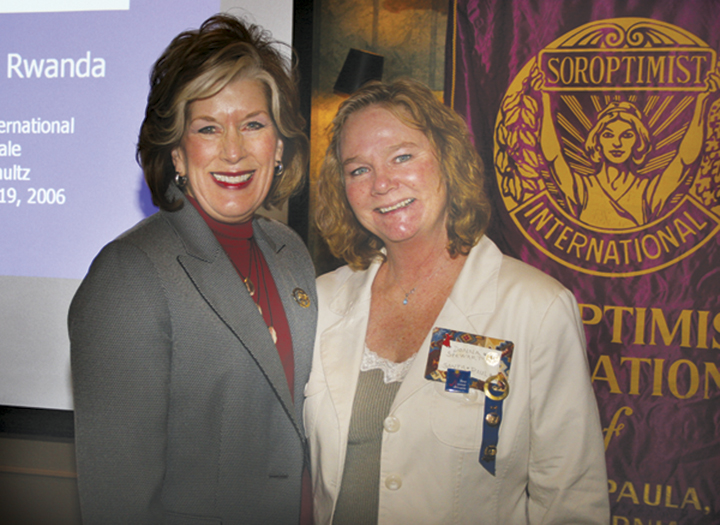Sandy Schultz attended a graduation ceremony for those completing the program. “Every woman who gave her testimony talked about her isolation and how alone and timid she felt before enrolling in the Project Independence program,” said Shultz. “Being a part of this program changed their lives and the lives of their families.“The theme for the whole week was that Soroptimist members are making a difference in the lives of these women. The look in their eyes and hugs of love when they were introduced was dramatic,” Sandy recalls. “Monetary support is vital, but the emotional connection is even a more important component. Knowing that another woman in another part of the world cares is very empowering to their self-worth.”“It takes so little to transform a woman’s life in a developing country,” said Schultz. “I see us all as channels to share the abundance God has given us to help each other. Extreme poverty has a human face.”

|
(Left) Sandy Schultz and (right) Donna Stewart, Soroptimist of Santa Paula. Schultz detailed her recent study tour in Rwanda for the Soroptimist Club of Santa Paula |
Soroptimist International of Santa Paula learns about crisis in Rwanda
February 07, 2007
Santa Paula News
By Susan Branham
Santa Paula TimesSoroptimist International of the Americas has a mission. It is stated succinctly and plainly: to improve the lives of women and girls, in local communities and throughout the world. One place where the vision is met is the nation of Rwanda, the scene of genocide, indescribable loss, and abandoned hope.Soroptimist International of Santa Paula learned about the continuing crisis in Rwanda when Sandy Schultz detailed her recent study tour to Kigali, Rwanda for the Project Independence, Women Survivors of War and Women for Women International programs. Many Soroptimist clubs help support the programs. Sandy Schultz is a member of the Board of Directors for Soroptimist International of the Americas. “This experience was life-altering for me,” Schultz said. “I have a new sense of commitment. I’ll never forget the lessons I’ve learned.” Rwanda is a small country about the size of Maryland, in East Africa. It is home to about 8 million people. “Forty-nine percent of the population is under the age of 15,” said Schultz.The genocide there in 1994 left an estimated one million people dead, and 300,000 orphaned. “The scars of the genocide remain,” Schultz said. The statistics are numbing. But in a place where a large number of men have been killed, many women and their children are finding that they are not alone, and they are discovering hope for the future. “Project Independence assists women survivors of war in partnership with Women for Women International,” Schultz explained.Women receive sponsorship, life skills and vocational training. Their training options include basic business and marketing skills, literacy, nutrition and health information. They can learn basket-making, batik, leather and bead work, hair dressing and agriculture. Training in beekeeping, animal husbandry and farming is also available.


